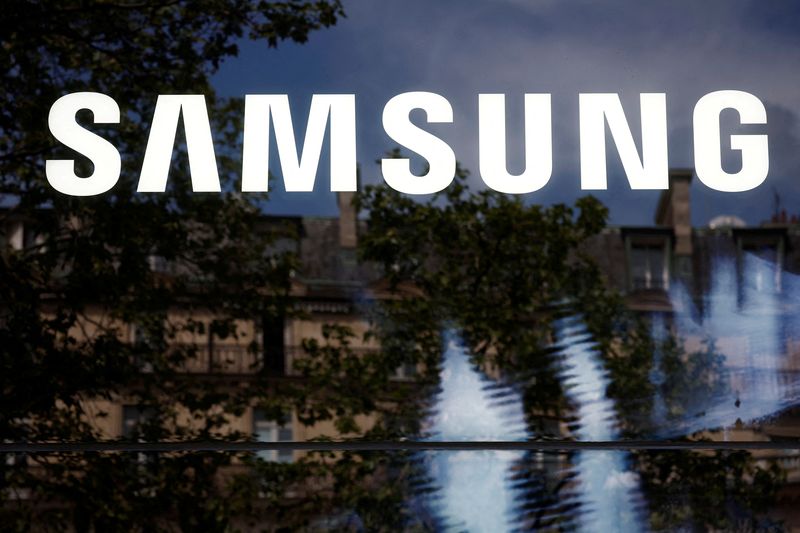By Heekyong Yang, Fanny Potkin and Karen Freifeld
SEOUL/SINGAPORE (Reuters) – Chinese tech giants including Huawei and Baidu (NASDAQ:) as well as startups are stockpiling Samsung Electronics’ (KS:) high-bandwidth memory (HBM) semiconductors in anticipation of U.S. restrictions on chip exports to China, three sources said.
Since the beginning of this year, the companies have ramped up purchases of artificial intelligence (AI)-compatible semiconductors, one of the sources said, helping China account for about 30% of Samsung’s HBM chip revenue in the first half of 2024.
The moves show how China is preparing to keep its technology ambitions on track amid rising trade tensions with the United States and other Western nations. They also show how the tensions are affecting the global semiconductor supply chain.
U.S. authorities plan to unveil an export control package this month that will impose new restrictions on shipments to China’s semiconductor industry, Reuters reported last week, citing sources.
Those sources also said the package would establish parameters to limit access to high-bandwidth memory chips. The U.S. Commerce Department declined to comment, but said in a statement last week that it is continually assessing the evolving threat environment and updating export controls “to protect U.S. national security and safeguard our technology ecosystem.”
Reuters was unable to determine the details of the proposed restrictions on HBM or their impact on China.
HBM chips are essential components in the development of advanced processors such as Nvidia’s (NASDAQ:) graphics processing units, which can be used for generative artificial intelligence work.
There are only three major chipmakers that produce HBM chips: SK Hynix and Samsung from South Korea, and Micron Technology (NASDAQ:) based in the United States.
China’s chip demand has largely focused on the HBM2E model, which is two generations behind the more advanced HBM3E version, people familiar with China’s interest in HBM said. The global boom in artificial intelligence has led to a shortage of the advanced model.
“As the development of domestic technology is not yet fully mature, Chinese demand for Samsung’s HBM has become exceptionally high, as other manufacturers’ capacities are already fully booked by American AI companies,” said Nori Chiou, investment director at Singapore-based White Oak Capital Partners.
While it is difficult to estimate the volume or value of HBM chips stockpiled in China, companies ranging from satellite makers to tech firms like Tencent have purchased them, the sources said. One of the sources said chip design startup Haawking recently ordered HBM chips from Samsung.
Meanwhile, according to one of the sources, Huawei has used Samsung HBM2E semiconductors to build its advanced Ascend AI chip.
Samsung and SK Hynix declined to comment. Micron, Baidu, Huawei, Tencent and Haawking did not respond to requests for comment. The sources declined to be named because of the sensitivity of the matter.
SAMSUNG VS HBM RIVALS
Chinese companies have made some progress in HBM production, with Huawei and memory chipmaker CXMT focusing on developing HBM2 chips, which are three generations behind the HBM3E model, Reuters previously reported.
But these efforts could be affected by new U.S. legislation.
Restrictions on HBM’s sales in China could have a greater impact on Samsung than on its main competitors, which are less dependent on the Chinese market, the sources familiar with the sales said.

Micron has stopped selling its HBM products in China since last year, while SK Hynix, whose major HBM customers include Nvidia, is focusing more on producing advanced HBM chips, they said.
SK Hynix said earlier this year that it is adjusting production to expand HBM3E output, and that its HBM chips have been sold out for this year and are nearly sold out for 2025.





